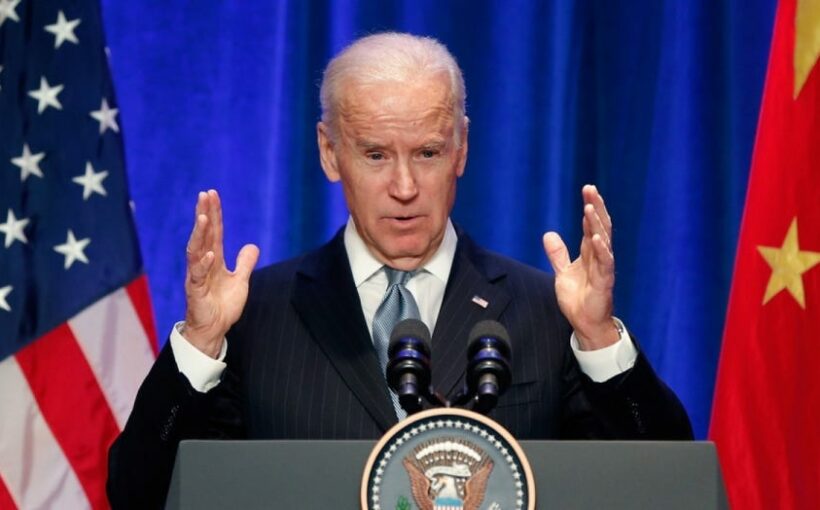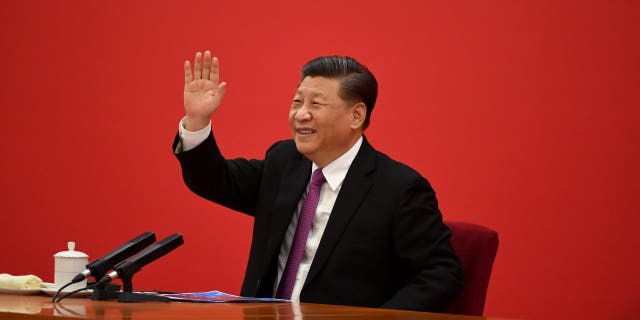Biden’s connection to China: Peter Schweizer
Author of ‘Red-Handed’ discusses what he believes is a compelling connection between the Biden family and China on ‘Life, Liberty & Levin.’
A new book reveals that California Democrat Sen. Dianne Feinstein repeatedly defended the public image of China’s ruling Communist Party while her husband reaped major profits from his Chinese business ties.
Over the last three decades, Feinstein has downplayed the human rights violations being perpetuated by the Chinese Communist Party, according to “Red-Handed: How American Elites Get Rich Helping China Win,” a newly released book by Government Accountability Institute President Peter Schweizer.
The book, which was released on Tuesday, says Feinstein’s husband, Richard Blum, has simultaneously grown his fortune immensely by doing business with the communist nation, at one point profiting from a company found to be spying on the U.S. military through Chinese products.
“He’s a businessman and he has a right to do business and he’s never done anything wrong,” said Feinstein spokesperson Kam Kuwata, according to the new book.
The senator has been a defender of China for decades, becoming the first U.S. mayor to visit the country while running San Francisco. Feinstein supported granting Most Favored Nation (MFN) trade status to China in 2000 – a designation that relaxed restrictions and encouraged a surge in U.S.-China economic cooperation. In 1994, when the U.S. Senate was considering rescinding this trade status with China over human rights violations, Feinstein argued against it, saying it would “inflame Beijing’s insecurities.”
Sen. Dianne Feinstein heads to a briefing Jan. 8, 2020, on Capitol Hill, on the details of the threat that prompted the U.S. to kill Iranian Gen. Qassem Soleimani in Iraq. (AP Photo/J. Scott Applewhite)
Feinstein also came to the nation’s defense when China was considered for entry into the World Trade Organization (WTO), which they successfully joined in 2001.
At the 1995 confirmation hearing for former U.S. Ambassador to China Jim Sasser, Feinstein offered a powerful defense to claims of human rights abuses committed by China, saying that the country was “changing” due to Western influence.
“It’s one thing to talk about human rights here. It’s another to walk in to Yin Tai and Zhongnanhai and talk about it with the president of China,” Feinstein said at the time. “Pounding the desk here isn’t going to make China change. China is changing. And it’s the Western influence in China that’s helping the change.”
Feinstein continued, comparing the 1989 massacre at Tiananmen Square to the U.S. government’s infamously botched 1993 stand-off in Waco, Texas.
“I was appalled as anyone by the tanks at [Tiananmen] Square, but three tanks of this government went into Waco, (Texas) and killed 29 children,” Feinstein said. “They weren’t criminals. Most of the people in Waco had no criminal record. Now those are not analogous; they are different situations. It was wrong of our government, and it was wrong of the Chinese government.”
Approximately 10,000 people were killed in the events surrounding the Tiananmen Square massacre, according to contemporaneous reports from English officials on the ground. Seventy-five people were killed at Waco, over 20 of them children.
The California senator also spoke out in 1997, demanding a U.S.-China joint commission on “the evolution of human rights in both countries over the last 20 or 30 years,” looking to compare “the success and failures [of] both Tiananmen Square and Kent State.”
“No one believes Feinstein is sincere in calling for such an inquiry,” journalist Ken Silverstein wrote at the time. “Her suggestion, the object of great scorn in Congress, is simply a smokescreen to prevent a serious look at China’s awful record.”
“There was originally this kind of anti-communist view of China,” Feinstein said in 2012. “That’s changing. … China is a socialist country but one that is increasingly becoming capitalistic.”
Chinese President Xi Jinping speaks with Russian President Vladimir Putin via a video link from Beijing, China, on Dec. 2, 2019.
(Noel Celis/Pool/Getty Images)
At the same time that Feinstein was cheering for Chinese leadership, her husband, Richard Blum, had concerning business ties to the communist nation.
“I can’t think of one single reason why the Chinese leadership would be wanting to help us with investment opportunities,” Blum once said of his ties to China.
In 1997, as his wife faced increasing scrutiny for her husband’s ongoing investment in the country, Blum pledged to donate personal profits from his Chinese investments to his own Tibetan refugee fund.
“This should remove any perception that I, in any way, shape or form, benefit from or influence my wife’s position on China as a U.S. senator,” Blum said.
In 2000, the Associated Press cited public documents in an exposé showing Blum’s firm, Richard C. Blum & Associates, was doing business in China with another firm under the joint venture Newbridge Capital. At the time of the article, the firm had invested at least $90 million in companies connected to mainland China.
In 2005, Chinese company Lenovo – itself formed with a donation of $25,000 from the government’s Chinese Academy of Sciences – purchased IBM’s personal computer business, launching the new enterprise into the global marketplace. U.S. officials were skeptical of the new company, concerned that Chinese ownership of the computer manufacturer would compromise security. An investigation was launched and eventually Lenovo was approved for business with the U.S. government. Feinstein had a seat on the Senate Intelligence Committee at the time.
Years later, U.S. officials found evidence of backdoor malware and spyware on government-purchased Lenovo laptops.
Lee Chieffalo, a security expert with the U.S. Marines, testified in 2010: “A large amount of Lenovo laptops were sold to the U.S. military that had a chip encrypted on the motherboard that would record all the data that was being inputted into that laptop and send it back to China […] That was a huge security breach. We don’t have any idea how much data they got, but we had to take all those systems off the network.”
Senate Judiciary Committee ranking member Sen. Dianne Feinstein speaks during a news conference after boycotting the vote by the Republican-led panel to advance the nomination of Judge Amy Coney Barrett to sit on the Supreme Court, Oct. 22, 2020, at the Capitol.
(AP Photo/J. Scott Applewhite)
Feinstein has positioned herself as an advocate against the ongoing Uygher genocide in the Xinjiang region of China as her personal investments remain in a blind trust. However, Blum’s personal investments in or out of the United States are known only to him, the senator claims.
“The senator has no involvement whatsoever in her husband’s financial or business decisions,” a spokesperson for the senator told Newsweek in December 2021 when asked about financial ties to the country.
In 2014, the FBI reportedly informed Feinstein, then-chairwoman of the Senate Intelligence Committee, that there had been allegations of a spy burrowed in her office. The suspected spy, Russell Lowe, served as Feinstein’s driver in California, but took on additional responsibilities in the office, such as working as a liaison to the Asian American community in California.
The staffer reportedly attended Chinese consulate events on behalf of the senator, and reportedly was recruited after being befriended by someone from China’s Ministry of State Security.
“Five years ago the FBI informed me it had concerns that an administrative member of my California staff was potentially being sought out by the Chinese government to provide information,” Feinstein said in a 2019 statement. “He was not a mole or a spy, but someone who a foreign intelligence service thought it could recruit.”
Feinstein said the FBI “reviewed the matter” and “shared its concerns” with her. The staffer was removed.
Sen. Dianne Feinstein wears a protective mask while speaking to reporters at the U.S. Capitol on Dec. 11, 2020.
(Stefani Reynolds/Getty Images)
Questionable connections to China do not end with Feinstein and Blum.
First son Hunter Biden reportedly had such a strong relationship with a Xi regime-linked Chinese businessman that he dubbed him the “Superchairman,” according to Schweizer.
“I think there’s no question. We spent more than a year investigating ‘Red Handed,’ and one of the most startling things we uncovered is the simple fact that the Biden family, while he was vice president of the United States and continuing when he became president, received some $31 million from Chinese individuals who are linked to the highest levels of Chinese intelligence,” Schweizer claimed.
One of those figures, he said, is investor Che Fung, chair of Chinese firm Ever Union Capital.
Fox News contacted Sen. Feinstein’s office for comment, but did not receive a response.
Fox News’s Brooke Singman contributed to this report.
Source: Read Full Article





